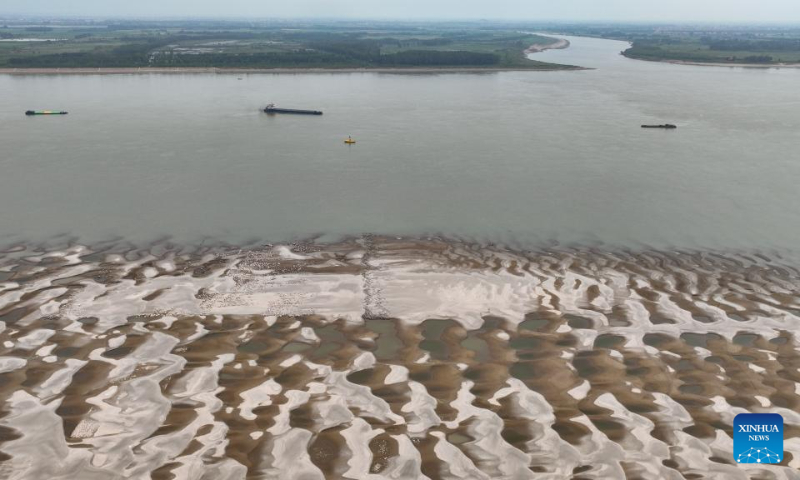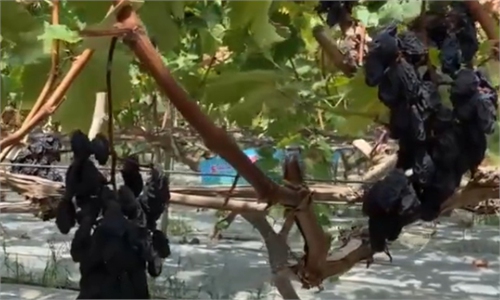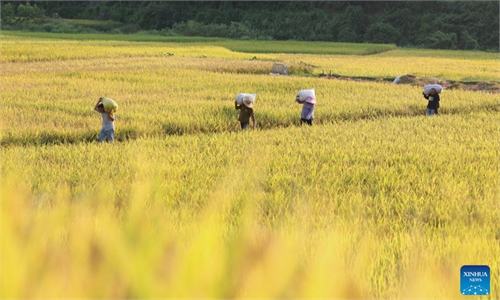Drought hits crops in Yangtze River valleys, but nation’s food security won’t be affected: expert
Impact deemed short-lived, won’t threaten food security: expert

Aerial photo taken on Aug. 24, 2022 shows a section of the Yangtze River in Chaisang District of Jiujiang City, east China's Jiangxi Province. Due to continuous high temperature and less rainfall, the water level of Yangtze River in some parts of Jiujiang City has fallen significantly. Jiangxi Province on Wednesday raised its drought emergency response from Level IV to Level III starting from 10 a.m. as the drought continues. (Xinhua/Zhou Mi)
As summer heat waves swept across the Yangtze River valleys in south China, and a prolonged drought is expected to extend into autumn there, the farmers are concerned that their rice output may drop this year.
But some agricultural experts said the impact of the drought will be short-lived, with no major threat to China's overall food security, thanks to the country's water diversion abilities.
The Xinhua News Agency has reported, due to continued hot and dry weather in southern China, the water level of Poyang Lake in East China's Jiangxi Province has dropped rapidly now. On Tuesday morning, the reading at one hydrological monitoring station in the lake had receded to about 7.99 meters. This broke the record of Poyang Lake entering the extremely dry season, 115 days earlier than the average since records began.
The climate center of Central China's Hunan Province also issued a red drought warning on Monday. A total of 50 counties and cities in the province have reached the level of extreme drought, accounting for 43 percent of the total area of the province.
Li Chunding, head of the Economics and Trade Department of the College of Economics and Management at China Agricultural University, told the Global Times on Tuesday that the heat and drought affected the growth of corn, soybeans and rice.
Late July to August is a critical period for the heading and flowering stages for local rice in the middle and lower reaches of the Yangtze River.
"It is the period when crops are most sensitive to temperature and water and therefore the impact from the drought and heat will be relatively large," Li said. Some regions have experienced rice growing problems like dry or cracked fields and withered rice leaves, which will adversely affect the yield.
The Global Times contacted several paddy farmers in Hunan Province. One of them in the city of Loudi said that the local weather has been the hottest in decades, and he expected rice output to shrink by about half there.
However, another farmer in Hunan surnamed Liu said that his rice fields are in a low-lying place, so the heat didn't hurt the crops too much. He noted that local officials have gone to great lengths to help farmers combat the abnormal weather, with measures such as diverting water from reservoirs and deep wells to irrigate the rice fields.
National Business Daily recently quoted a farmer from Jiujiang of Jiangxi Province as saying that this year's drought has been the worst since he began planting rice about 20 years ago. His output is down and he has lost some money as a result.
According to the Ministry of Water Resources on August 30, rainfall in the middle and lower reaches of the Yangtze River, as well as the Dongting Lake and Poyang Lake areas in September will be 20-50 percent less than previous years, and the drought is unlikely to ease shortly.
However, some agricultural experts said that the drought won't have a major impact on China's overall rice output, because the situation is unlikely to last a long time.
The impact of the drought will be short-lived with no major threat to China's food security, thanks to China's ability to divert water supplies among different areas, He Zhiqing, a retired research fellow from the Chinese Academy of Social Sciences, told the Global Times on Tuesday.
"The drought has been mainly caused by extreme weather. However, China has advanced water diverting facilities and drought relief mechanism, which can be operated flexibly," He said.
Li also said that the drought is unlikely to trigger a large reduction in autumn grain production, or cause severe price volatility.
China has sufficient inventory of edible oil and grain, with a strong ability to prevent market risks, he said, adding that the affected southern regions could plant beans or tubers to make up for the losses caused by the drought.



